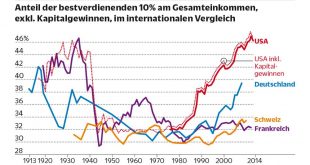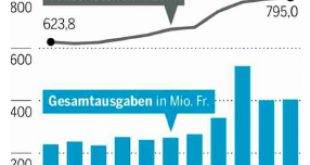In the FT, Leslie Hook reports that activist investors want Apple to address concerns over smartphone addiction and the mental health effects of phone use among children. They refer to psychologist Jean Twenge according to whom teenagers today (“the iGen”) … are more vulnerable than Millennials were: Rates of teen depression and suicide have skyrocketed since 2011. It’s not an exaggeration to describe iGen as being on the brink of the worst mental-health crisis in decades. Much of this...
Read More »Inequality in the United States
… meanwhile, inequality in the US remains more of an issue. On Alphaville, Kadhim Shubber summarizes a DB Global Markets Research study on US inequality: More than 30% of US households have zero or negative non-home wealth. Wealth is increasingly concentrated among the old, and among the wealthy. Observers paint the picture of an increasingly dysfunctional society. And they point to the relevance of inequality for political polarization and accountability.
Read More »Inequality in Switzerland
In a paper, Reto Föllmi and Isabel Martínez document trends in income and wealth inequality in Switzerland over the last 100 years. Daniel Hug reports in the NZZaS (figures below taken from NZZaS). Data (World Wealth and Income Database, based on tax records). Some findings: Income inequality has been rather stable and is modest … … although social mobility as reflected in educational attainment is low. Income inequality at the very top has increased. The top 1% of income recipients earn...
Read More »United Nations
“Regulierung und Wettbewerb (Regulation and Competition),” FuW, 2017
Finanz und Wirtschaft, December 13, 2017. PDF. Ökonomenstimme, December 15, 2017. HTML. Regulation is about aligning private and social trade-offs. When banks cause negative externalities, good regulatory interventions increase banks’ costs. Externalities may differ across countries, so nothing suggests that regulation induced costs should be the same internationally.
Read More »Swiss Perfectionism
In Der Bund, Adrian Sulc comments on the Swiss National Bank’s perfectionism. Keine andere Schweizer Organisation kommuniziert so professionell wie die SNB, keine andere Organisation kann so gut dichthalten. Perfectionism is costly. Der Personalbestand ist in den letzten fünf Jahren um 18 Prozent auf 795 Vollzeitstellen gestiegen. … Die durchschnittlichen Lohnkosten pro Mitarbeiter betragen mittlerweile 155 000 Franken pro Jahr. Dies weil gemäss Nationalbank fast ausschliesslich...
Read More »Blockchain Based Equity Settlement in Australia
In the FT, Jamie Smyth reports that the Australian Securities Exchange plans to introduce a blockchain based equity clearing and settlement system. ASX will operate the system on a secure private network with known participants. The participants must comply with regulation, according to the ASX, which said its system had nothing to do with blockchain technology deployed by cryptocurrencies such as bitcoin.
Read More »Cash Demand
On VoxEU, Clemens Jobst and Helmut Stix argue that … cash balances for transactions comprise only a modest share of overall cash demand (a rough estimate of 15% might be a good guess across richer economies). … changes in currency in circulation are dominated by motives like hoarding. While transaction demand is reasonably well researched … still too little is known about non-transaction demand in general, and recent increases in particular.
Read More »“Casablanca”
Premiere: November 26, 1942 in New York.
Read More »Forecasting In Finance
It’s the time of the year when financial advisors feel obliged to produce forecasts for the coming year. This is often a waste of time, for the writers and the readers. In the Wall Street Journal, James Mackintosh writes that [f]orecasting is difficult, but this year showed exactly how pointless it can be: Markets performed opposite of virtually all predictions. Previous blog post.
Read More » Dirk Niepelt
Dirk Niepelt




